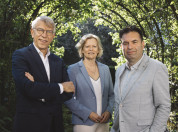News
Search results
-
Three NIOO researchers on the Highly Cited Researchers list of 2024
Three NIOO researchers are on this year's Clarivate Analytics' “Highly Cited Researchers” list. Paolina Garbeva for the first time, two others for the seventh consecutive year: Jos Raaijmakers and Wim van der Putten.
-
Steven Declerck appointed professor at KU Leuven
From 1 October, the Belgian university KU Leuven has appointed Steven Declerck as professor at the Department of Biology. Steven Declerck is an aquatic ecologist at the Netherlands Institute of Ecology (NIOO-KNAW), where his research focuses on the ability of zooplankton to adapt to environmental changes. In this interview, Declerck talks about his career and field of research.
-
The hidden world of wood-decaying fungi
Of all the components of dead plants, wood is the hardest to break down. How come fungi know how to do this? What issues did they need to solve to achieve this? The Netherlands Institute of Ecology (NIOO-KNAW) tries to find answers to these questions. The research has yielded surprising discoveries. These could be useful for sustainable forest and nature management, sustainable agriculture and even the development of new medicines. -
International assessment NIOO-KNAW yields positive results
‘Outstanding research’, an ‘impressive societal impact’ and ‘highly viable’. This is how the independent international assessment committee sees the Netherlands Institute of Ecology (NIOO-KNAW). Such an evaluation visit takes place once every six years to assess quality, relevance and viability of research. The evaluation report and its responses have now been finalised and published.
-
Societal Advisory Board will help to connect ecological knowledge with society
Societal developments with a link to ecology and ecological research are easy to find. How can the Netherlands Institute of Ecology (NIOO-KNAW) support these? How will we share and use ecological knowledge? To achieve this, the institute will from now on receive help from the new Societal Advisory Board.
-
Rising sea levels danger to shorebirds
Oystercatchers will decline by 56 to 79 percent on three Wadden Islands over the next 100 years. This is according to results from James Cook University in Australia which continues on previous research by NIOO.
-
Departure of NIOO director and appointment of interim director
As of 1 October, current director Geert de Snoo will leave the Netherlands Institute of Ecology (NIOO-KNAW). Wim van der Putten is appointed as interim director by the KNAW. -
The value of long-term studies
It can take years to notice the effects of changes in nature. Long-term research is therefore essential. If there are far fewer great tits or winter moths in a year, is that an exception or a new trend due to climate change? The long haul needed to measure this year-on-year is a big challenge. The National Institute for Ecological Research NIOO-KNAW, which celebrates its 70th anniversary this month, does this kind of research. What does it teach us?
-
Migrating starlings are no copycats
Young, naïve starlings are looking for their wintering grounds independently of experienced conspecifics. Starlings are highly social birds throughout the year, but this does not mean that they copy the migration route from each other. By revisiting a classic ‘displacement’ experiment and by adding new data, a team of researchers at the Netherlands Institute of Ecology (NIOO-KNAW) and the Swiss Ornithological Institute (Vogelwarte Sempach) have settled a long-lasting debate. Their findings are now published in the scientific journal Biology Letters.
-
New Board of Management KNAW appointed
The Royal Netherlands Academy of Arts and Sciences announced the appointment of three members of the Board of Management, effective 1 October 2024. The current director of NIOO Geert de Snoo has been appointed Director of Research Policy, Adriana Esmeijer Director of General Affairs, Iwan Holleman Director of Operational Management. The new Board of Management succeeds the Academy’s acting Board.
-
bacLIFE: How AI distinguishes the good from the bad and the ugly
A study published in Nature last month described how researchers used artificial intelligence to predict the "lifestyle" of certain bacteria (meaning whether they are beneficial or harmful). For this, the researchers created an algorithm named "bacLIFE", which compares the genome of a species with unknown lifestyle, to that of similar species with known lifestyles.
-
Buzzing decline: Dutch landscape is losing insect-pollinated plants
The Netherlands is losing plant species that rely on pollination by insects. Leiden environmental scientist Kaixuan Pan demonstrates this after analysing 87 years of measurements from over 365,000 plots. The news is alarming for our biodiversity and food security. "75 per cent of our crops and 90% of the wild plants rely on insects."
